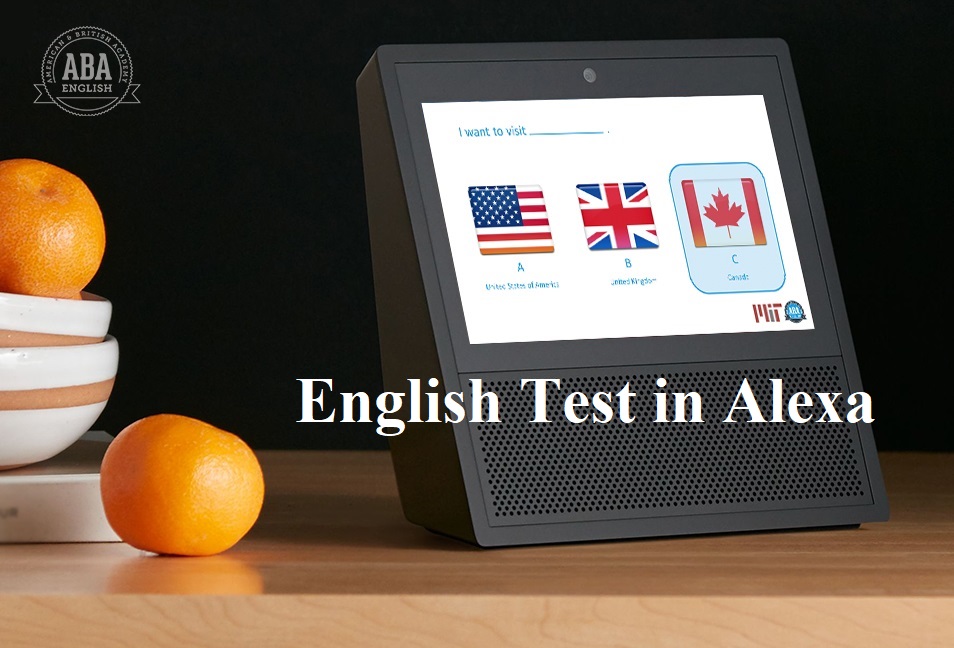A leap forward in AI ethics and safety
July 5, 2024

For people learning English all over the world, who wish to discover their proficiency in English and practice speaking, the English Test for Alexa Echo Show, is the only English-language proficiency test based on interacting vocally with Alexa which assesses your level of English by simulating a human conversation. Contrary to all other digital language level tests available today, English Test on Alexa is the first test to assess English proficiency by simulating a human conversation.
 A team of MIT Auto-Id Lab developers and ABA English Language Lab linguists is behind this innovative level test, currently available in Beta version for free in the Amazon store worldwide.
A team of MIT Auto-Id Lab developers and ABA English Language Lab linguists is behind this innovative level test, currently available in Beta version for free in the Amazon store worldwide.
English Test is the first Alexa skill that allows users to assess their English level through the voice recognition technology of Amazon’s well-known assistant, which is available in the USA, Germany and UK at the moment.
In addition to assessing English language proficiency, English Test also provides broader learning opportunities to practice listening and speaking, since users can do the exercises by verbally interacting with Alexa while also doing other things (cooking, sports, etc).
 People in general, such as journalists, developers, tech AI specialists, language experts and of course ABA linguists and teachers, have shown a great deal of excitement about this innovative project. Language experts specifically expressed admiration when seeing English Test’s accuracy in delivering a precise result in terms of proficiency level. And experts in Alexa technology and development were surprised to see the high level of interaction achieved, given the current limitations of the Alexa technology itself.
People in general, such as journalists, developers, tech AI specialists, language experts and of course ABA linguists and teachers, have shown a great deal of excitement about this innovative project. Language experts specifically expressed admiration when seeing English Test’s accuracy in delivering a precise result in terms of proficiency level. And experts in Alexa technology and development were surprised to see the high level of interaction achieved, given the current limitations of the Alexa technology itself.
Overall, a lot of anticipation and looking forward to being able to use it widely in countries where Alexa is still not available. English Test will always operate in English, naturally, but one does need to have Alexa available in your country to be able to enjoy it.
A fervent opponent, if not well informed on the realities of artificial intelligence applied to language learning, might accuse English Test of doing away with the job of human teachers in the future. Not at all true. In ABA, where we provide human teachers to all our students to counsel, guide their learning process and motivate them, we see huge benefits in using artificial intelligence to unburden teachers from repetitive tasks, freeing their time to assist and teach students in more creative and engaging ways.
The greatest advocate would surely see the revolutionary aspects of English Test: we’re opening the door to a new way of understanding and developing online learning. Our Alexa skill brings enormous new possibilities for deepening digital learning and personalizing educational content.
The new Alexa Echo Show device includes a screen that provides the user with visual cues and also enables writing, in addition of course to voice, and this is why we chose it for English Test. Thanks to these additional functions we are able to blend and train all the language skills -listening, reading, speaking and writing- through our product. This means we can continue to experiment and continue adding further learning activities via English Test in the future.
Precisely that working with a voice assistant with a screen opens up multiple new possibilities for delivering language learning digitally.
 English Test would be in the B section of the matrix, where the collaboration between human and machine is high and the results excellent.
English Test would be in the B section of the matrix, where the collaboration between human and machine is high and the results excellent.
This is so because the English Test skill is designed with a dual path of profile and proficiency questions, helping Alexa learn from your replies and improving every time you use it again. This combination of profile and proficiency questions is unique and keeps students engaged throughout the test. And the more the English Test skill is used, the more attuned to the specific user its questions will be (thanks to machine learning). Alexa asks you different things depending on your previous answer, opening a new route of questions related to our stated interests and replies. The more you use English Test on Alexa, the better she will know you -remembering your motivations, preferences, needs, gaps, best study times, etc- and so will help you more and more with your English. The possibilities are endless and provide a clear benefit to the learner of English.
This is the first major advance in the field of artificial intelligence applied to language learning. It opens the door to a new way of learning languages digitally through personalization: learning content will increasingly be delivered to students through artificial intelligence means, personalized at the level and speed needed by each individual student. And making education available to many more people in the world than it is today.
Progresses being made in parallel in Natural Language Processing (NLP) will boost the natural assimilation of a language and will enhance the efficacy of English Test, improving this new way of learning digitally.
A completely new and personalized way of learning languages digitally. This is the expected progress we expect and are working towards.
Thank you Maria Perillo and Brian Subirana.
Maria Perillo is Chief Learning Officer at ABA English. Brian Subirana is Director of the MIT Auto-Id Lab.